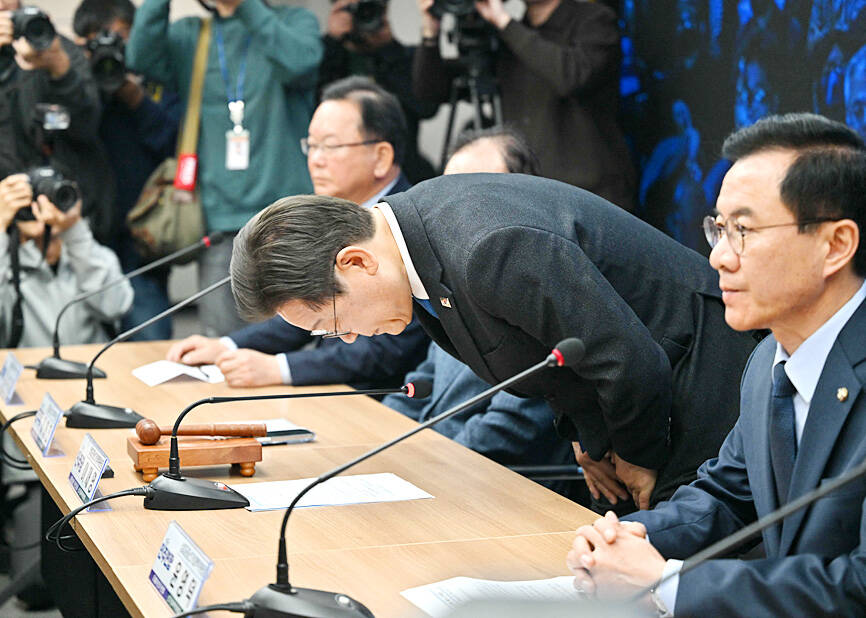South Korea’s opposition was heading toward a landslide victory in Wednesday’s parliamentary elections, exit polls indicated, in a major blow to President Yoon Suk-yeol.
The outcome, if confirmed, would at the very least leave Yoon as a lame duck for the three remaining years of his term in office, and could even open the way for his impeachment.
The Democratic Party of Lee Jae-myung — survivor of a January knife attack by a disgruntled voter — and its satellites are forecast to win as many as 197 seats, up from 156 in the last parliament.

Photo: AFP
Yoon’s People Power Party and its partner were projected to be trailing on between 85 and 99 seats, down from 114, the exit polls conducted by three major broadcasters indicated.
All opposition parties combined might even secure a super-majority of 200 in the 300-seat parliament, which could in theory allow them to attempt to remove Yoon from office before his term ends in 2027.
That includes the new Rebuilding Korea party, led by former South Korean minister of justice Cho Kuk, which capitalized on discontent with the two main parties to pick up a projected 12 to 14 seats.
“The people have won, the will to judge the Yoon Suk-yeol administration is very clear,” Cho said after the vote, local media reported.
On the campaign trail, he vowed to make Yoon “first a lame duck, then a dead duck.”
“The figures today show the strong anger of people at Yoon for his two-year governance,” political analyst Yum Seung-yul said.
Yoon beat Lee in South Korea’s closest-ever presidential election in 2022 and has taken a tough line with the nuclear-armed North while improving ties with Washington and former colonial occupier Japan.

Conflict with Taiwan could leave China with “massive economic disruption, catastrophic military losses, significant social unrest, and devastating sanctions,” a US think tank said in a report released on Monday. The German Marshall Fund released a report titled If China Attacks Taiwan: The Consequences for China of “Minor Conflict” and “Major War” Scenarios. The report details the “massive” economic, military, social and international costs to China in the event of a minor conflict or major war with Taiwan, estimating that the Chinese People’s Liberation Army (PLA) could sustain losses of more than half of its active-duty ground forces, including 100,000 troops. Understanding Chinese

The Ministry of Foreign Affairs (MOFA) yesterday said it is closely monitoring developments in Venezuela, and would continue to cooperate with democratic allies and work together for regional and global security, stability, and prosperity. The remarks came after the US on Saturday launched a series of airstrikes in Venezuela and kidnapped Venezuelan President Nicolas Maduro, who was later flown to New York along with his wife. The pair face US charges related to drug trafficking and alleged cooperation with gangs designated as terrorist organizations. Maduro has denied the allegations. The ministry said that it is closely monitoring the political and economic situation

UNRELENTING: China attempted cyberattacks on Taiwan’s critical infrastructure 2.63 million times per day last year, up from 1.23 million in 2023, the NSB said China’s cyberarmy has long engaged in cyberattacks against Taiwan’s critical infrastructure, employing diverse and evolving tactics, the National Security Bureau (NSB) said yesterday, adding that cyberattacks on critical energy infrastructure last year increased 10-fold compared with the previous year. The NSB yesterday released a report titled Analysis on China’s Cyber Threats to Taiwan’s Critical Infrastructure in 2025, outlining the number of cyberattacks, major tactics and hacker groups. Taiwan’s national intelligence community identified a large number of cybersecurity incidents last year, the bureau said in a statement. China’s cyberarmy last year launched an average of 2.63 million intrusion attempts per day targeting Taiwan’s critical

‘SLICING METHOD’: In the event of a blockade, the China Coast Guard would intercept Taiwanese ships while its navy would seek to deter foreign intervention China’s military drills around Taiwan this week signaled potential strategies to cut the nation off from energy supplies and foreign military assistance, a US think tank report said. The Chinese People’s Liberation Army (PLA) conducted what it called “Justice Mission 2025” exercises from Monday to Tuesday in five maritime zones and airspace around Taiwan, calling them a warning to “Taiwanese independence” forces. In a report released on Wednesday, the Institute for the Study of War said the exercises effectively simulated blocking shipping routes to major port cities, including Kaohsiung, Keelung and Hualien. Taiwan would be highly vulnerable under such a blockade, because it